
Branching Path: Josh Torres’s Top 10 Games of 2021
Well dear reader, here we are - the end of 2021. Truthfully, it was probably the worst year of my personal life. There were some pretty bad tragedies on my end but you know, that’s life. I gotta keep on moving forward with my chin up, despite my circumstances not looking well in multiple ways. The world is still not sure when it wants to recover from 2020 either. I truly, truly hope 2022 is a turning point for me and a lot of others. Sometimes things turning for the worst is the beginning of the rest of your life, so I’ll try my best to start it off on the right foot.
Nevertheless, 2021 for video games was a neat year for me. There were a lot of big and small releases that caught my eye; sometimes it was too much. A lot of stuff I was looking forward to for years finally came out too, like that final Evangelion movie and the Tsukihime remake. I’ll never forget 2021, for better or worse.
Dear reader, I wish you a very happy new year. Thank you for all your support to me and the rest of the site. We all greatly appreciate it, far more than you may realize.
With all that said, these are my top 10 games of 2021.
10) Operation: Tango
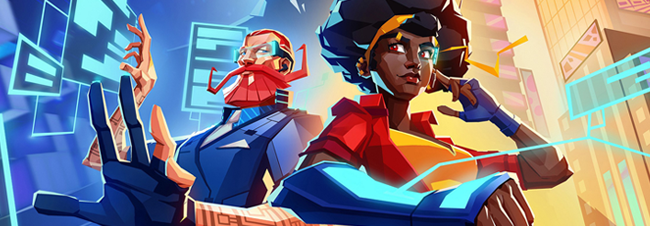
Not many people know about this game and that’s ok. Operation: Tango is a mission-based two player co-op game where one takes on the role of an Agent and the other is the Hacker. Both sides do different activities to help one another to progress through a level. Interestingly enough, my appreciation for Operation: Tango grew after my buddy and I finished the critically acclaimed It Takes Two. We finished this game first before jumping into that one and we both felt that this was the stronger game, despite all the praise It Takes Two got.
Despite all the flashy setpieces in It Takes Two, the overall package just felt… less satisfying as a co-op experience compared to Operation: Tango. There were a lot of interesting mechanics that reinforced just how different the experience was between being the Agent and Hacker, leading to more captivating co-op puzzle sequences. It also helps that Operation: Tango aims for a simple and straightforward story, instead of the rubbish It Takes Two tried to do. I had parents who got divorced much earlier on in my life and I never appreciated what It Takes Two tried to do with its narrative.
9) Monster Hunter Rise
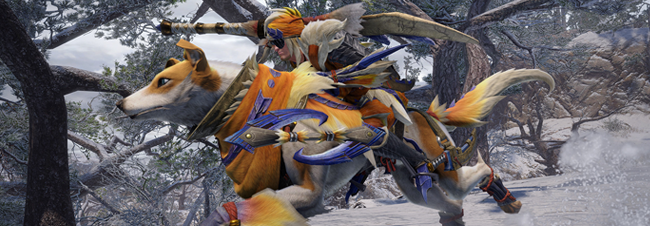
I sank so much time into Monster Hunter Rise in its first week. It was a nice return to the “classic” structure of Monster Hunter after World. The new Wirebug mechanic and adorable Palamutes added a new flavor to the MH formula. I spent most of my time on the Hammer throughout my 140+ hours with the game and kept up with it when the rest of the story was added.
There’s so much quality-of-life enhancements in modern MH games now that I can appreciate, but some part of my brain still says “this is cool and all, but I don’t feel like I really worked for it” because I’m still stuck in the Freedom Unite era mindset - which is still probably my favorite. Regardless, I’m probably going to pick up the PC version. I suppose I’ll do it all over again because Capcom hates me and couldn’t be bothered to add cross-save between the Switch and PC releases. I’m looking forward to the Sunbreak expansion for G Master Rank because as we all know, Monster Hunter doesn’t really start until that.
8) Returnal
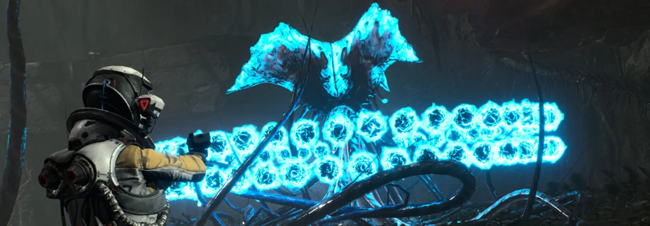
Returnal was a game I hated at first. I’ve been a fan of Housemarque’s games for a long time and the dark, drab atmosphere of Returnal initially turned me off. Housemarque’s previous titles usually started in a very energetic manner, with a vibrant variety of colors dripping throughout every part of the mayhem they presented. Returnal seemed like an antithesis to what I liked about Housemarque. But I gave it a chance.
And I was rewarded with some of the best action gameplay of the year. Returnal’s story took a backseat for me compared to how fun it was to master the flow of its gameplay. This is where the PS5’s adaptive triggers really took this game to another level as I was constantly switching between primary and secondary firing modes constantly to adapt to situations. I’m still not too hot on its roguelike structure, but there’s no denying that once things click, it is some of the most fun I had this year.
7) Scarlet Nexus

If you’ve read my stuff before, then first thank you so much and second, you know that I tend to value original titles over the usual sequels. That’s not to say I hate sequels; in fact, you’ll see a good chunk of them on this list, but my curiosity these days doesn't dwell on sequels - it’s the games that have no proven track record behind them.
When Scarlet Nexus was initially announced, I wasn’t sure what to make of it. The whole “brainpunk” angle to it all was, and still is, corny… but a tiny bit endearing. Although the final product is flawed in some key ways, there is a lot of it that clicked for me. Its battle system flowed so well, as you got more and more powers at your disposal to play around with. I especially dug how I was able to combine powers in stupid ways, such as the duplication power mixed with the elemental buffs. Being able to fling environmental objects in the middle of attack strings always felt cool.
While Scarlet Nexus’s character bond episodes didn’t have the greatest implementation, the nightmare imagery of the ever growing base with characters’ belongings filling it up provided some of the best “little touches” I’ve seen in games this year. The game’s soundtrack also surprised me too. I hope Scarlet Nexus gets a sequel; there’s enough enticing plot-hooks that have me wondering what’ll happen next.
6) NieR Replicant ver.1.22474487139...
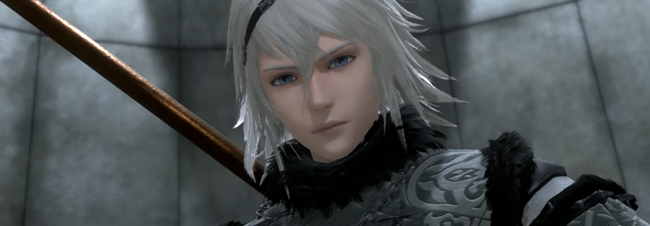
The original NieR finally gets the re-release it deserves. Sure, there will be people who are bummed because it’s not the Papa Nier version, and I get it, but I’ve always preferred Brother Nier.
I’m surprised at how NieR Replicant ver.1.22 managed to capture the spirit of the original, beloved cult classic so well. I was skeptical because of Toylogic’s track record, but they surpassed my expectations easily. Every part of the game was lovingly recreated and improved upon sections that really needed it, like the battle system. I’m glad they went for a more simplistic, but weighter, approach to combat, instead of attempting to copy Automata. Sure, there are light touches and influences of Automata still in there (that hilarious dash-to-be behind enemy animation in Replicant ver.1.22 is still so ridiculous), but it’s ultimately inoffensive in the grand scheme of things.
It’s so weird seeing the original NieR get Square Enix’s “AAA” treatment with every single dialogue of every character voiced, including NPCs. All the new content is handled and implemented quite well. The entire OST got remastered with a full orchestra treatment, along with a few brand-new tracks; it’s powerful how much Replicant ver.1.22 got to flex. The only thing that was missing for me was a toggle option between the original and remastered soundtracks. Don’t get me wrong - the remastered music is still lovely, but the original is the one I initially fell in love with and something I want to hear again when I play the original NieR.
5) Shin Megami Tensei V
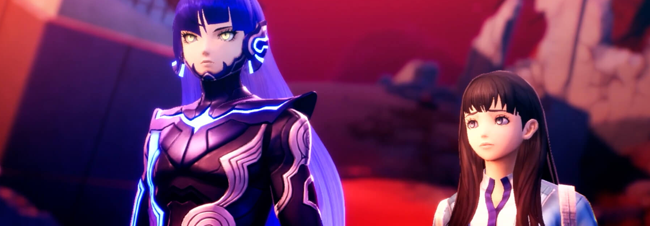
Finally, V has come to. With the launch of Shin Megami Tensei V, all of the games that were announced when Nintendo Switch was first unveiled have finally been released. I really enjoyed my time with SMT V, but being confined to only the Switch at the moment was its downfall for me, ironically enough. Its inconsistent performance and laggy menus irritated me quite a lot.
There’s a lot of refinements to the SMT formula that I appreciated in V. The discourse has been divisive over the change to limited-time buffs in V, but I ended up liking that aspect. Alterations in how subsequential, unused “full” press turns are now half-consumed for some party management actions, unlike previous entries, made battles feel more about adaptation on-the-fly, rather than mere trial-and-error. All the improvements to the fusion system and interface made me invest in V’s fusion system more so than a lot of other mainline SMT titles.
I like SMT V a lot for things it does under-the-hood on a mechanical level and how it integrates demons into its open environments, as if they were like animals. There are numerous aspects that were subpar and/or fell short for me overall, so SMT V is far from my favorite SMT unfortunately. Nevertheless, it’s still a remarkable achievement and a solid next step on where the mainline SMT series should go visual presentation-wise.
4) Metroid Dread
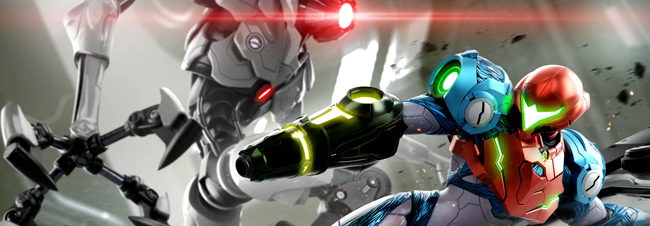
A brand-new original 2D Metroid game in… god knows how long it’s been. And it ended up being fantastic? That’s insane.
Metroid Dread is one of those projects that feels like a miracle that it somehow all came together. I wasn’t the biggest fan of Mercury Steam’s Samus Returns, so I was shocked at how much I vibed with Dread after everything was said and done. It helps that the game was so tightly tuned to make it feel so responsive to control; there is the occasional hitch here and there still, though.
I liked the inverse nature of Samus having to climb back up to her ship in Dread, rather than the usual exploration loop of going down. It masks its linearity decently, though as a fan of Fusion, I don’t really care how linear or non-linear a Metroid game is, as long as it ends up being an enjoyable ride. The E.M.M.I. gimmick in Dread ended up being alright for me too. It kept me on my toes and the chase sequences led to some goofy moments for me. I was worried that it almost overstayed its welcome, but it ended right before I got tired of them. The final boss was a lot of fun and I hope to see more future Metroid games on a home console.
3) Fantasian
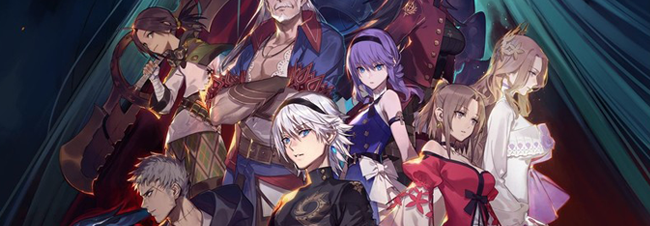
I very, very rarely ever buy a stupid, expensive device for a single thing, yet here I am with an Apple TV just for Fantasian. I’m not here to tell you that the amount of money I burned was worth the price of admission. If you already have an iOS device that can run Apple Arcade games and like RPGs, absolutely play Fantasian.
It is such an odd, magical game. Sakaguchi, Uematsu, and all the wonderfully talented developers at Mistwalker struck gold on this one and unfortunately many, many people will miss out on this gem until it hopefully gets ported elsewhere eventually. The approach to its visuals will forever stick with me, as its environments are all composed of meticulously crafted dioramas from talented individuals all over the world. It exudes a dream-like atmosphere as a result throughout its shot composition as players explore levels.
This is also one of the most challenging RPGs I’ve ever played that really forces every player to become masters at understanding all their party members, their abilities, and their potential roles based on the way they build them. I absolutely love that Fantasian flips the idea of enemy idle animations in JRPGs on its head, since those become absolutely pivotal in figuring out how to even do damage to some devious encounters. It’s such a cool game and I wish it was more accessible to play.
2) Lost Judgment
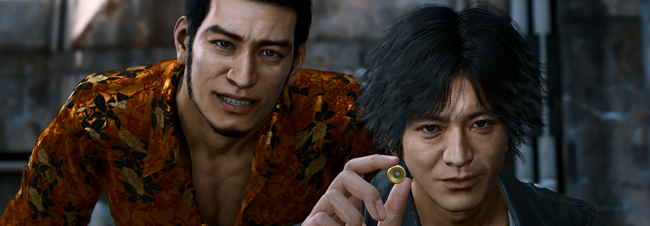
Lost Judgment is such a crazy game. I don’t know where to even begin with how much I loved this game. This vastly improved pretty much every single aspect of the first Judgment game. Aside from a very few weak side activities, just about everything for this game hit for me. Judgment was about introducing who Yagami was to the player; Lost Judgment is about exploring who Yagami is, and it fully realizes the depths of his characterization and ideals throughout the course of the game.
There are things that Lost Judgment does to help form its own identity, rather than being seen as the Yakuza series’s younger sibling. Certain sequences and moments in Lost Judgment doesn’t make it feel like a Yakuza game at all; it feels like something truly new for RGG Studio, despite it primarily taking place at where Yakuza: Like A Dragon was set.
I sunk so many hours in a lot of the side activities because there was a side narrative incentive to do so; it was honestly a brilliant move in how the Mystery Research Club unifies a lot of that together. Lost Judgment also has some of my favorite story beats in any RGG Studio game ever, and one of my favorite final showdowns in 2021.
1) Gnosia
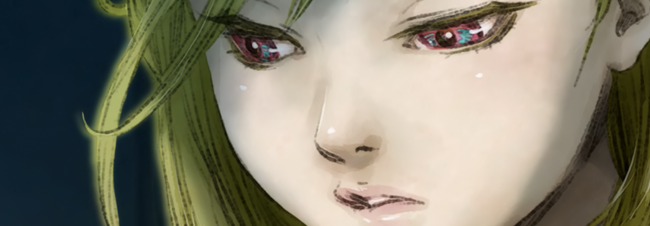
Walking into 2021, I never would have imagined this would be my Game of the Year. I love time travel stories that are executed well, and Gnosia is one the most powerful games I’ve ever experienced. There’s nothing quite like it; I love that it just nonchalantly came out of nowhere for me. Video games are most memorable to me if they clearly show off experiences that only work in the realm of them. Gnosia only works as a video game, and it achieves that brilliantly.
No other game this year quite matches up to this simple little RPG that is all told through time loops of Werewolf/Mafia-style game rounds. You, the player, are immediately directly involved from the get-go and fittingly, you start off not knowing anything. Just like in real life when you’re picking this up for the first time, your in-game character has no idea what in the world is going on. And that’s okay. The game slowly opens up and teaches you everything you need to know in the first two dozen loops.
Does that sound batshit crazy and overwhelming already? Don’t worry. There’s a nice pick-up and play nature throughout this game. Each game, or loop, roughly only takes 15 minutes at max. As players organically learn the game inside and out, they’ll naturally start going faster and faster - to the point they’re no longer reading text. Instead, they’re manipulating outcomes based on stats and abilities they’ve accumulated through leveling up.
All you have at your disposal is words. What you choose to do with them is how you engage in Gnosia’s “battle system” as you, the player, decide to accuse, support, lie, or merely play a passive role, in order to either find out who is a Gnosia, or eliminate everyone else if you happen to be a Gnosia. Describing this game would take all day and I recommend you read my comprehensive review if you’re curious.
If time travel existed, I imagine Gnosia encapsulates a lot of what it must feel like to be a growingly weary time traveler - the isolation, the loneliness, the feeling of hopelessness, and the small glimmer of a light at the end of the tunnel to be free of your unusual circumstances as you loop through time… again. And again. And again. And again.